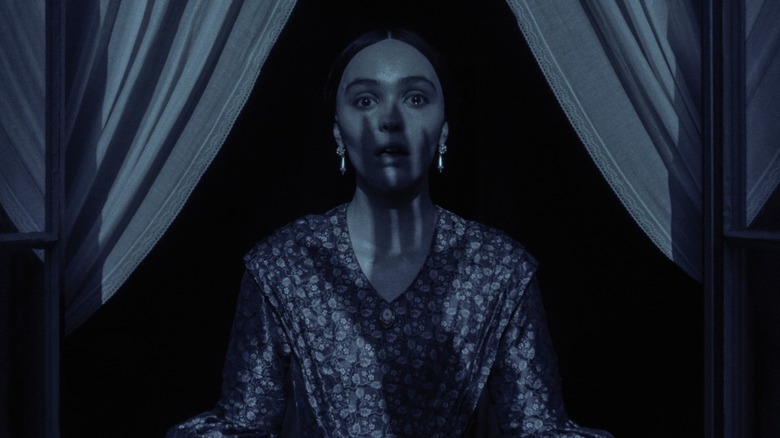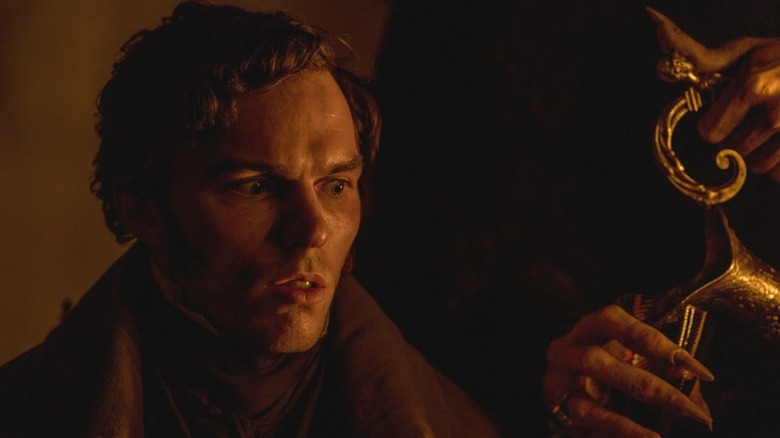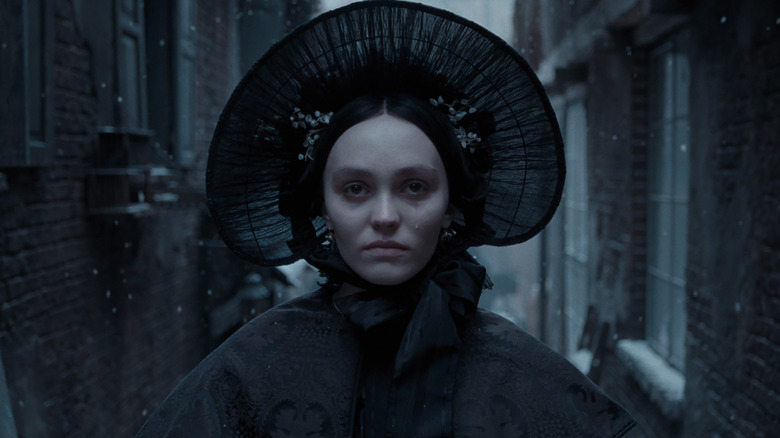Nosferatu Review: Robert Eggers Resurrects The Vampire Classic As A Genuinely Scary Fever Dream
When it comes to horror movies, I don't scare easily. This isn't a boast about my bravery; I'm simply desensitized. I grew up immersed in the horror genre, and I'm so devoted to horror movies that I've become mostly inoculated to their raw power. I still love horror — it's my favorite genre — but I rarely ever get scared when I watch a scary movie. So when a horror movie comes along and actually gives me the creeps, I consider it an achievement. Enter Robert Eggers' "Nosferatu," a movie that sent chills down my spine and made my heartbeat quicken. Eggers has pulled off something special: a gothic, ghoulish phantasmagoria that has the power to scare the hell out of you. This is all the more impressive due to the fact that Eggers isn't exactly treading new ground here — he's remaking F. W. Murnau's classic silent film, which was, of course, heavily (and illegally) influenced by Bram Stoker's immortal vampire classic "Dracula." Eggers' take on the material sticks pretty closely to the events from both Murnau's movie and Stoker's novel, and yet, the filmmaker creates something that never feels like a rehash or a regurgitation. The end result is stunning and scary, full of swooping, swooning, doomed romanticism and moments of pure, unblinking horror.
Eggers, who helmed "The Witch," "The Lighthouse," and "The Northman," is a filmmaker seemingly obsessed with the past. All of his films, including "Nosferatu," are firmly rooted in bygone eras, and the director has a knack for creating a sense of authenticity. I'm no historian, so I can't comment on how "accurate" Eggers' films are. But since all of his movies deal with the strange and the supernatural, accuracy doesn't really apply, nor is it really important. Instead, what matters is that these movies feel authentic. As a filmmaker working with top-notch production teams, Eggers is skilled at telling stories that have a tangible sense of real history to them. "Nosferatu," like all of Eggers' previous films, doesn't come across as a recreation — it truly seems like we're somehow gazing back into the past. It's tantamount to time travel. "Nosferatu" is set in 1838, and the costumes, the scenery, and the customs swirl about to create the world of the film, a cold, wintry world of certain death (the story is set around Christmas, complete with a Christmas tree lurking in the background of a scene).
Again, if you've seen the original "Nosferatu," or Werner Herzog's 1979 remake, or any of the many adaptations of "Dracula," you'll be familiar with the story beats on display here: an ancient (and foreign) vampire targets a group of young characters, bringing death and destruction in his wake. But Eggers finds exciting ways to weaponize that familiarity; we expect the story to unfold in a certain way, and we're surprised when things are slightly off kilter. All of this is aided by a genuinely unnerving atmosphere, with numerous scenes that play out with the logic of a fever dream. There were multiple times throughout the course of the film where I felt absolutely dizzy, my head swimming, my senses overloaded with the nightmare world being revealed.
Lily-Rose Depp is mesmerizing in Nosferatu
As "Nosferatu" begins, ambitious solicitor Thomas Hutter (Nicholas Hoult) leaves his home in Germany to head to a remote village in the superstitious wilds of Transylvania, where he's due to close a real estate deal with the mysterious nobleman Count Orlok (Bill Skarsgård). But of course, Orlok is no mere man — he's an ancient vampire who thirsts for blood ... and more. Skarsgård has big vampire shoes to fill here: Orlok is one of cinema's most iconic monsters, played so memorably by Max Schreck, Klaus Kinski, and others over the years. Rather than recreate the classic rodent-like monster makeup that Schreck and Murnau employed so effectively in the original film (and which numerous other films have borrowed), this Orlok has a look all his own. I won't dare spoil it since the marketing has gone to great lengths to keep it a secret, but it effectively transforms Skarsgård into something otherworldly and appropriately inhuman. Employing a deep, thick, guttural accent, Skarsgård completely disappears into the role and makes the character his own. His Orlok feels ancient; we can practically smell the centuries of rot, decay, and grave dirt coating his wax-like flesh. Eggers and cinematographer Jarin Blaschke often keep Orlok in the shadows — we never really get a good, clear look at him, which makes the character all the more unsettling.
Orlok has more on his mind than acquiring a new property in Germany. He's drawn to Hutter's bride, the troubled, melancholy Ellen, played mesmerizingly by Lily-Rose Depp. Eggers has been talking about making his version of "Nosferatu" for some time now, and he initially wanted his "The Witch" star Anya Taylor-Joy to play the part of Ellen, but scheduling got in the way of making this happen. As a fan of Taylor-Joy, I was initially disappointed that she could not reunite with Eggers for this tale of terror. But any hesitation I had was immediately swept away by Depp's stellar performance, which is remarkable in its ferocity. Ellen is a tormented woman — tormented not just by Orlok, but by her own dark mind. Depp throws herself into the role, often literally, bringing an alarming physicality that invokes Isabelle Adjani's terrifying performance in Andrzej Żuławski's "Possession," a manic psychosexual film that seems to have greatly influenced what Eggers is going for here.
Ellen and Orlok have a kind of unspeakable bond that influences every aspect of the film. An opening prologue shows that Ellen has seemingly summoned this creature of the night through her own inflamed passions; the mix of tampered sexual lust and debilitating depression are a kind of catnip to Orlok, who literally reaches out across time and space with a clawed hand. Has Ellen somehow manifested this evil presence with her own thoughts? Or is it something completely beyond her human control? Ellen feels like a character who is truly damned, cursed to suffer due to the very nature of her being. The dark contract between Ellen and the vampire had me thinking of a line uttered by a doomed character in the haunting found footage flick "Lake Mungo": "I feel like something bad is going to happen to me. I feel like something bad has happened. It hasn't reached me yet but it's on its way."
Nosferatu is genuinely scary
Orlok eventually arrives in Germany, bringing with him hordes of rats and plague. He is death personified; a walking, talking corpse who feeds on the living (Eggers has the vampire sink his teeth into people's chests, right at their hearts, rather than their throats). Soon, everyone around Ellen is caught up in the torment and horror, including her dear friend Anna (Emma Corrin) and Anna's befuddled husband, Friedrich (Aaron Taylor-Johnson, who does a great job playing a man easily threatened by what he deems to be hysterical women). Every vampire film needs vampire hunters, which brings the kindly Dr. Sievers (Ralph Ineson, one of the few signs of warmth in an ice-cold movie) onto the scene. Realizing he's out of his league, Sievers turns to his old teacher, the alchemist Professor Albin Eberhart Von Franz, played with just the right amount of mania by the great Willem Dafoe. (Dafoe gets all the best lines in the film, including a moment where he proclaims "I've seen things that would make Isaac Newton crawl back into his mother's womb!")
And yet, all of these mere mortal characters are rendered ineffectual when butting up against unspeakable evil. Madness and mania abounds, swirling about like snow, then seizing us in a vice-like grip. Aided by Blaschke's gorgeous, candlelit cinematography and Robin Carolan's sweeping, tragic score, Eggers creates a kind of sensory overload with "Nosferatu." Like Ellen, the film wildly swings through an array of overwhelming moods and emotions. "Nosferatu" is simultaneously scary, sexy, strange, and sad. Eggers employs a few too many jumpscares for my tastes, but the real horror arises from how out-of-control everyone and everything feels here. As Orlok growls and stalks his way through the darkness, a prevailing sense of unshakable dread takes hold. Like death itself, Orlok feels almost inevitable; inescapable.
I've seen nearly every "Dracula" adaptation you can think of and know the story inside and out, yet "Nosferatu" managed to take me by surprise. But most of all, it scared me. It scared me the way a particularly bad nightmare does. The type of nightmare that's so powerful it ultimately jolts you awake and has you grasping at the sheets, desperate to escape its ethereal snare. The type of nightmare that doesn't quite fade away even when you return to the waking world, even when you turn on all the lights, even when the first rays of dawn creep in through the windows. "Nosferatu" isn't just a great horror movie, it's one of the best movies of the year.
/Film Rating: 9 out of 10
"Nosferatu" opens in theaters on December 25, 2024.


